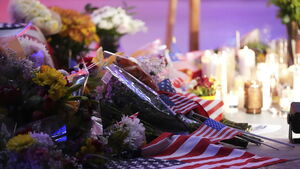Herald Opinion: When anger festers unchecked democracy is threatened

Flowers, candles and American flags sit at a vigil for Charlie Kirk, the CEO and co-founder of Turning Point USA who was shot and killed, on Thursday, September 11th in Orem, Utah. Pic: Ap Lindsey Wasson
“Bang bang you’re dead, fifty bullets in your head.” One of those childish rhymes from schooldays is still lodged somewhere in the back of my mind alongside the playground chants and the verses we actually learned properly in class. It came to me as I sat down to write this column.
Naturally, my mind turned to the week that was — and, inevitably, to America. Once again the headlines have been dominated by Donald Trump’s orbit. This week his close ally Charlie Kirk, just 31-years-old, was shot dead on a college campus in Utah in a hate-fuelled assassination that shocked even a country so accustomed to violence, and a grim reminder of how fragile democracy becomes when anger festers unchecked.
What troubles me most is the creeping sense that this same corrosive hatred the sneers, the threats, the dehumanisation of opponents is seeping into our own politics in Ireland. Tánaiste Simon Harris has become the latest figure to attract the attention of “head-the-ball” thugs, who have reportedly threatened not only him but also his wife, children, and brother. A low act, but sadly it appears to be a deliberate campaign of intimidation rather than isolated lunacy.
Ireland, of course, has been here before. In the 1970s, Des O’Malley, as Minister for Justice, became the sworn enemy of the IRA and their allies. His wife Pat’s family pub was blown up twice in revenge for the measures he took against them — measures carried out without fear or favour. O’Malley lived under armed protection and carried a gun himself, trained by the gardaí in its use. Thankfully, he never had to use it, but those who knew him believed he would not have hesitated if pushed. That was a different Ireland, scarred by violence yet shaped by a political class unafraid to stand its ground.
Fast forward to today, and the threats against Harris are very real. But I admit I am uneasy about the way he is speaking so openly about them. To my mind, it risks giving the thugs exactly what they crave, attention, and proof that their intimidation is working. Bullies thrive on visibility, and sometimes silence, backed by strong security, is the wiser course.
In fairness, Ireland is still a safer place than most. We don’t have America’s gun culture. Yes, there are plenty of legally held shotguns and rifles, but access to automatic weapons is rare, gun crime is far less common, and our homicide rate is mercifully lower. Yet this should not make us complacent, because the poison that drives violence is not just about weapons — it is about words, attitudes, and the erosion of respect.
And it is on social media, that I see the most worrying signs. The level of bile and abuse online has become relentless. People now feel entitled to say the most outrageous things about others, without thought or consequence. I’ve seen TikTok videos targeting Roscommon councillors that border on slander. But when those behind them have nothing to lose, what recourse is left? How can you sue somebody with nothing? And even if you did, would it undo the reputational damage inflicted at the click of a button?
This is the real issue: the collapse of respect in public life. Politicians, councillors, even the President himself are now routinely mocked, insulted, and labelled “scum” on platforms where abuse has become the currency of attention. The idea of disagreeing respectfully, or of recognising the office even if you dislike the person, has vanished. Respect for authority has gone and with it, respect for community.
We now have a growing group of people who see their role only as to protest, disrupt, and sneer, without offering constructive solutions or making any meaningful contribution. There is a world of difference between protest that challenges power with ideas, and protest that exists only to tear down. One builds democracy; the other corrodes it.
If this is not checked, we risk drifting down the same dangerous path as America, where anger becomes normalised, opponents are treated as enemies, and violence no longer shocks but is expected. Ireland has been here before in darker days, and we should know better than to stumble back into that ditch.
It’s time we relearned the value of respect, not deference, not blind loyalty, but the basic civility that allows us to live together, argue fiercely, and yet remain part of the same society. Without that, all that remains is hatred — and hatred, as America shows us, eventually finds its trigger. And once it does, there is no rhyme to silence it.





